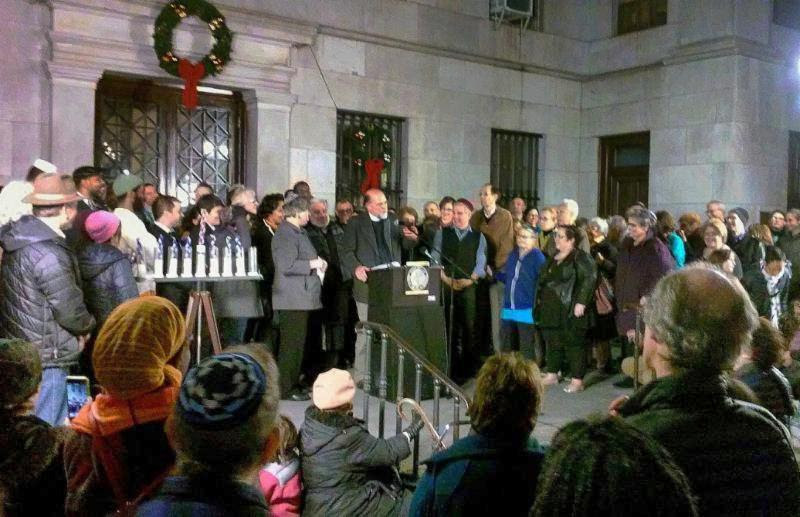Brita Rose
These are some dark times. A corner of our world is enduring unimaginable suffering due to a conflict that shows no sign of relenting. 300,000 Syrians have been killed and 600,000 remain under siege at the hands of a tyrannical government, or now ISIS. As a result, eleven million people have been displaced in what has become the worst human disaster of this century.
Of the displaced, four million Syrians have sought refuge in neighboring countries. These hospitable nations have reached full capacity and, as a result, this summer refugees began a more perilous journey into Europe via land or sea. Thousands have already perished making this journey.
As world leaders have scrambled to respond to this crisis, there is re-emerging a dark and ugly social response to the growing needs of the victims of this conflict. We have been there before: after 9/11; after a mosque/community center was built near the World Trade Center site; and after the tragic Paris and California attacks. Now more than half the nation's governors say they oppose letting Syrian refugees into their states, (even though the federal government has both the plenary power and the power of the '1980 Refugee Act' to place refugees anywhere in the country).
Islamophobia, minority discrimination and anti-Muslim hatred are not something new in the U.S., but they are a cancer to our culture -- an affront to the values of a pluralistic nation that stands--at least on paper--for justice, fairness and the common good of all. They are anathema to a nation built by immigrants and on the principle of offering refuge to the homeless, weary and oppressed, as we find inscribed inside the pedestal of the Statue of Liberty:
"Give me your tired, your poor,
Your huddled masses yearning to breathe free,
The wretched refuse of your teeming shore.
Send these, the homeless, tempest-tossed to me,
I lift my lamp beside the golden door!"- Emma Lazarus' sonnet, New Colossus
There is another text in which alludes to the idea of providing refuge to the weary and oppressed.
"This is what the LORD says: Do what is just and right. Rescue from the hand of his oppressor the one who has been robbed. Do no wrong or violence to the alien, the fatherless or the widow, and do not shed innocent blood in this place." Jeremiah 22:3
"For I was hungry and you gave me something to eat, I was thirsty and you gave me something to drink, I was a stranger and you invited me in." Matthew 25:35
In the spirit of shining light into the darkness surrounding these developments, several local interfaith leaders organized to speak of this light last Saturday, December 12th, outside Brooklyn Borough Hall. Coinciding with the seasons of Hanukkah and Christmas, through a 'Hanukkah candle lighting prayer vigil'--sponsored by Brooklyn Borough President, Eric Adams, Kolot Chayeinu and other local faith groups-- in unity we declared this light of love, hope and peace.

In a beautiful, quiet and attentive gathering of hundreds who spilled out onto the street on a cool December night under Christmas wreaths and the light of Menorah candles, we listened, we sang songs, and we prayed. Jewish, Christian and Muslim faith leaders and others united in their appeal to welcome the refugee and stand against hatred and injustice. Rev. David Rommereim, pastor of Lutheran Church of the Good Shepherd in Bay Ridge, Brooklyn, invoked the name of Dietrich Bonhoeffer, a saint of the last century, who also stood against oppression and spoke light into the darkness of his time during WWII.
In this spirit over 10,000 American Jews nationwide have signed a letter to stand against recent proposals from the 'airwaves', from calling for a registry to track Muslims to having an outright ban on Muslim immigrants. In solidarity with this Jewish community we say "Never again" to profiling and discriminating against any group. We call on our leaders to allow Syrians along with other refugees into America. If the total number of refugees set to be accepted from around the world in fiscal year 2016 is 85,000 (all under rigorous security), then there is room for the President's proposed 10,000 Syrians.
On Saturday there were a few hecklers on the fringes of our gathering waving American flags and shouting hateful and fearful slogans against immigrants. The silence of hundreds gathered in the name of love and peace seemed to somehow drown them out, and they eventually disappeared. As Dr. Martin Luther King, Jr. said, "Darkness cannot drive out darkness; only light can do that. Hate cannot drive out hate; only love can do that."
We will continue to shine our light by promoting our hope of a culture of acceptance, equality, and of hospitality to strangers--particularly those suffering the perils of war, hunger or oppression. It is what the United States stands for as a country of immigrants. It is also what we do as a people of faith, and it is with this faith that we see the light prevail.